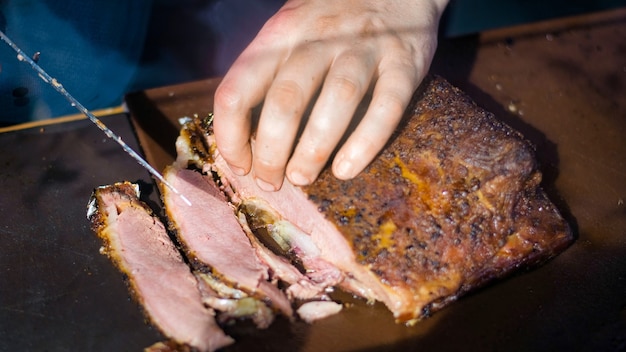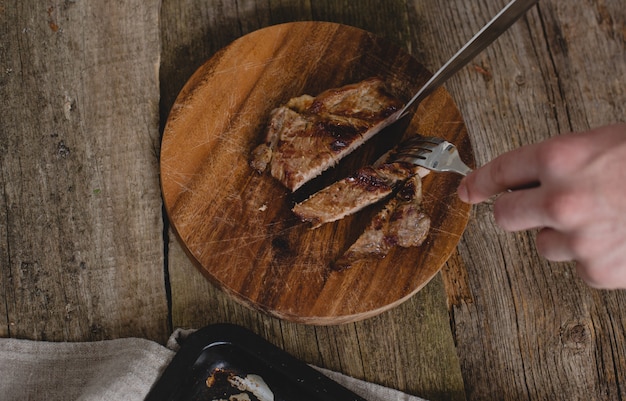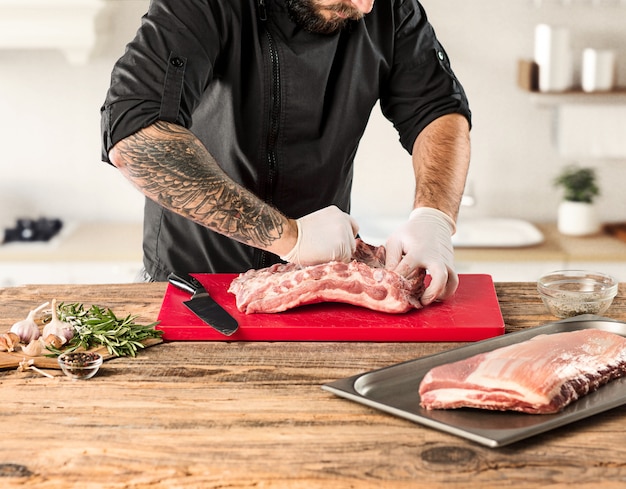Let's face it, a perfectly cooked pork steak is a thing of beauty. That juicy, tender, slightly pink center with a crispy, golden-brown crust? It's pure culinary magic. But we've all been there – the dry, tough pork steak that leaves you wondering what went wrong. Fear not, my friends, because I'm here to share my years of experience and hard-earned wisdom to help you master the art of the perfect pork steak. Buckle up, because this guide is going to take you on a delicious journey from choosing the right cut to creating flavour-packed masterpieces.
(Part 1) The Pork Steak: A Closer Look

First things first, let's talk about what we're actually dealing with here. A pork steak is essentially a cross-section of the loin, and it comes in a range of thicknesses, each with its own unique characteristics.
The thickness is crucial! Think of it like choosing the right tool for the job. For a quick, pan-fried steak, a thinner cut is the way to go. But if you’re aiming for a juicy, oven-roasted delight, a thicker cut is your best bet. The thickness dictates the cooking time and method, so understanding it is essential for achieving the perfect result.
Choosing the Right Pork Steak
Now, let's talk about choosing the right cut. Imagine it like picking the perfect pair of jeans – it's all about the fit! You want a steak that is evenly thick, with no weird bumps or gaps. A good butcher will be able to guide you through the different cuts, but here are some things to keep in mind:
- pork loin: This is the most common cut, and it's great for pan-frying, grilling, or roasting. It's generally a good all-rounder for any pork steak recipe.
- pork tenderloin: This is a leaner cut, perfect for quicker cooking methods like grilling or stir-frying. It's known for being very tender, making it ideal for recipes where you want a delicate texture.
- pork chops: These are bone-in cuts of pork loin, ideal for roasting or grilling. The bone adds a fantastic flavour and helps to keep the meat moist during cooking.
Assessing the Quality
Don't just grab the first steak you see! Take your time and look at the quality. You want a steak that has a healthy pink colour, not pale or overly red. The fat should be firm, not mushy, and the texture should be springy, not soft. If you see any discoloration or a slimy feel, put it back. A good quality steak is essential for a delicious final product.
(Part 2) The Power of Marinades

Now, let's get into the fun stuff – marinades! They are your secret weapon when it comes to flavour and tenderness. A good marinade can transform an ordinary pork steak into an extraordinary dining experience.
You can get as creative as you like with your marinades, but a good one should always include:
- Acidity: This helps to tenderize the meat and brighten the flavour. Think lemon juice, vinegar, or even a splash of citrus soda.
- Oil: Oil helps to keep the meat moist and prevents it from drying out during cooking. Olive oil, vegetable oil, or even avocado oil are all great choices.
- Herbs and spices: This is where you can really let your imagination run wild! Experiment with your favourite herbs and spices to create your own unique flavour profile.
My Favourite Marinades
Over the years, I've tried countless marinades, but these are the ones that always stand out for me:
- Garlic and Herb: This is a classic for a reason! It's simple, aromatic, and incredibly versatile. Simply mix together olive oil, garlic, rosemary, thyme, and a squeeze of lemon juice. Let the steak soak for at least an hour for maximum flavour, but overnight is even better!
- Honey and Soy: This marinade gives your pork steak a delicious, tangy sweetness. Combine soy sauce, honey, ginger, garlic, and a pinch of red pepper flakes for a touch of heat. Marinate for at least 2 hours.
- Spicy Mango: For a burst of tropical flavour, mix mango puree, lime juice, chilli flakes, and a touch of cumin. This one is perfect for grilling. The sweetness of the mango pairs beautifully with the smoky char of the grill.
Remember, the longer you marinate, the more flavour your steak will absorb. I usually let my steaks soak for a minimum of 2 hours, but overnight is even better. It allows the flavours to really meld together and penetrate deep into the meat, creating a truly flavourful experience.
(Part 3) cooking techniques: Mastering the Heat

Alright, here's where things get exciting – the cooking! There are several ways to cook pork steaks, each with its own unique flavour and texture. Let's explore them.
Pan-Frying for Quick and Delicious
For a quick and easy weeknight dinner, pan-frying is your go-to method. It’s perfect for thinner cuts of steak and requires minimal fuss.
- Get that pan hot: Use a cast iron pan or a heavy-bottomed skillet. Heat it over medium-high heat until it’s piping hot. This ensures a nice crispy crust on the outside of the steak.
- Pat dry: Before adding the steak to the pan, pat it dry with paper towels. This helps to achieve a beautiful golden-brown crust and prevents the steak from steaming rather than searing.
- Season generously: Salt and pepper are your best friends here. Season liberally just before cooking. A good sprinkle of salt and pepper really brings out the natural flavours of the pork.
- Sizzle time: Once the pan is scorching hot, add the steak. Don’t overcrowd the pan – cook in batches if needed. The pan should sizzle when you add the steak, indicating it’s hot enough for a good sear.
- Flip it: Cook for 2-3 minutes per side for medium-rare. You’ll know it’s ready when you get a nice sear on both sides. A good sear gives the steak a crispy texture and adds a layer of delicious flavour.
- Rest is key: Once you’ve achieved the desired doneness, remove the steak from the pan and let it rest for 5-10 minutes before slicing. This allows the juices to redistribute, making for a more tender and flavorful steak.
Grilling for that Smoky Goodness
Grilling is perfect for those balmy summer evenings. It brings out that smoky flavour we all love and is ideal for thicker cuts of steak.
- Fire up the grill: Heat your grill to medium-high heat. For gas grills, make sure the burners are preheated evenly. For charcoal grills, use good quality charcoal and let it burn until the coals are ash-white. This ensures a consistent temperature for cooking.
- Clean and oil the grill grates: This prevents the steak from sticking and helps to achieve those beautiful grill marks. A clean and oiled grill will result in even cooking and beautiful sear marks.
- Grill time: Place the steaks directly over the heat. Cook for 3-4 minutes per side for medium-rare. You’ll want to achieve a nice sear on both sides, just like in pan-frying.
- Indirect heat: Once the steaks are seared on both sides, move them to a cooler part of the grill or turn off one burner on a gas grill. This allows the steak to cook through without burning. Indirect heat ensures the steak cooks evenly to your desired doneness.
- Rest and slice: Once the steak reaches your desired doneness, remove it from the grill and let it rest for 5-10 minutes before slicing. This allows the juices to redistribute for a more tender and flavourful steak.
slow roasting for Tender and Juicy
If you’re looking for a foolproof method for tender, juicy pork steaks, slow roasting is the way to go. It's a perfect choice for thicker cuts and allows for a more even cooking process.
- Preheat the oven: Set your oven to 350°F (175°C). This ensures the oven is at the right temperature for a consistent roast.
- Grease a baking dish: Use a little olive oil to prevent the steak from sticking. This helps to ensure the steak doesn’t stick to the dish and allows for even browning.
- Season and roast: Place the seasoned steak in the baking dish and roast for 20-25 minutes for medium-rare. The internal temperature should reach 145°F (63°C).
- Rest and slice: Remove the steak from the oven and let it rest for 10-15 minutes before slicing. This allows the juices to redistribute for a more succulent steak.
You can also add vegetables to the baking dish for a one-pan meal. Just make sure they’re chopped to roughly the same size as the steak so they cook evenly.
(Part 4) Internal Temperature: Knowing When It’s Done
This is where a trusty meat thermometer comes in handy! It’s the only way to truly know when your pork steak is cooked to perfection.
Doneness Guide:
| Doneness | Internal Temperature (°F) | Internal Temperature (°C) |
|---|---|---|
| Rare | 125-130 | 52-54 |
| Medium-Rare | 130-140 | 54-60 |
| Medium | 140-150 | 60-65 |
| Medium-Well | 150-160 | 65-71 |
| Well Done | 160 | 71 |
Remember, pork should be cooked to an internal temperature of 145°F (63°C) to ensure safety. If you’re unsure, err on the side of caution and cook it a little longer.
The texture will change as the steak cooks. A rare steak will be soft and pink, while a well-done steak will be firm and brown. It’s all a matter of personal preference!
(Part 5) Glazing for Extra Shine
Want to take your pork steak to the next level? Add a glaze! Glazes are sweet and savory sauces that you brush onto the steak during the last few minutes of cooking. They add a beautiful shine and a burst of extra flavour.
Easy Glaze Recipes:
- honey-mustard glaze: Combine honey, Dijon mustard, and a pinch of salt and pepper. The honey provides sweetness, the mustard adds tang, and the salt and pepper balance out the flavours.
- Maple-Soy Glaze: Mix together maple syrup, soy sauce, ginger, and garlic. This glaze creates a delicious balance of sweet, salty, and savory notes.
- Cherry-Port Glaze: Combine cherry preserves, port wine, and a touch of balsamic vinegar. This glaze adds a touch of tartness and complexity to the pork steak. The cherry preserves add sweetness, the port wine provides depth, and the balsamic vinegar adds a touch of acidity.
Brush the glaze onto the steak during the last 5-10 minutes of cooking. The heat will caramelize the glaze, creating a sticky, delicious coating. This adds a beautiful shine and a burst of flavour to the pork steak.
(Part 6) Serving Your Pork steak masterpiece
So, you've cooked your pork steak to perfection. Now it's time to show it off!
Classic Sides for Pork Steaks
Pork steaks are incredibly versatile and pair well with a variety of sides. Here are a few of my favourites:
- mashed potatoes: A classic comfort food that complements the richness of the steak. The creamy texture of mashed potatoes contrasts beautifully with the crispy exterior of the pork steak.
- Roasted vegetables: Asparagus, Brussels sprouts, or sweet potatoes are great choices. Roasted vegetables add a touch of sweetness and earthiness to the dish.
- green beans: A light and fresh side that balances the richness of the steak. The crispness of green beans adds a contrasting texture and freshness to the meal.
- Apple sauce: A sweet and tangy counterpoint to the savoury steak. The sweet and tart flavours of apple sauce complement the savory pork beautifully.
- Salad: A fresh and vibrant side that adds a pop of color to your plate. A salad adds a touch of lightness and freshness to the meal, balancing out the richness of the pork steak.
Don't forget to garnish your steak with fresh herbs, a squeeze of lemon juice, or a sprinkle of parsley for a touch of elegance. A simple garnish can elevate the dish to a new level of sophistication.
(Part 7) Beyond the Basic: Exploring Pork steak recipes
Okay, we've covered the essentials, but let's get creative! Here are a couple of pork steak recipes to get your taste buds tingling.
Pork Steaks with Creamy Mushroom Sauce
This recipe is a flavour bomb! The creamy mushroom sauce perfectly complements the juicy pork steak.
- Ingredients:
- 2 pork steaks
- 1 tablespoon olive oil
- 1 onion, chopped
- 1 pound mushrooms, sliced
- 2 cloves garlic, minced
- 1/2 cup white wine
- 1 cup heavy cream
- 1 tablespoon chopped fresh parsley
- Salt and pepper to taste
- Instructions:
- Season the pork steaks with salt and pepper.
- Heat the olive oil in a large skillet over medium-high heat.
- Cook the steaks for 3-4 minutes per side, or until cooked to your liking.
- Remove the steaks from the skillet and set aside.
- Add the onion to the skillet and cook until softened, about 5 minutes.
- Add the mushrooms and cook until they are tender and golden, about 10 minutes.
- Stir in the garlic and cook for 1 minute.
- Pour in the white wine and bring to a simmer.
- Reduce the heat to low and simmer for 5 minutes, or until the sauce has thickened slightly.
- Stir in the heavy cream and parsley.
- Season with salt and pepper to taste.
- Return the steaks to the skillet and cook for 1-2 minutes, or until heated through.
- Serve the steaks with the mushroom sauce.
grilled pork steaks with Mango Salsa
This is a light and refreshing dish perfect for summer. The sweet and spicy mango salsa adds a burst of flavour to the grilled pork.
- Ingredients:
- 2 pork steaks
- 1 ripe mango, diced
- 1/2 red onion, diced
- 1/2 cup chopped fresh cilantro
- 2 limes, juiced
- 1 jalapeno pepper, seeded and minced (optional)
- Salt and pepper to taste
- Instructions:
- Season the pork steaks with salt and pepper.
- Grill the steaks over medium-high heat for 3-4 minutes per side, or until cooked to your liking.
- While the steaks are grilling, combine the mango, red onion, cilantro, lime juice, and jalapeno (if using) in a bowl.
- Season with salt and pepper to taste.
- Let the salsa sit for at least 15 minutes to allow the flavors to meld.
- Serve the grilled pork steaks topped with the mango salsa.
(Part 8) Pork Steak Leftovers: Don’t Waste Them!
Let’s be honest, we all have those moments when we’ve cooked more than we can eat. But don’t fret! Pork steak leftovers are a great opportunity for a delicious meal the next day.
Creative Leftover Ideas:
- Pork Steak Salad: Slice the leftover steak and toss it with your favorite salad greens, dressing, and vegetables. This is a quick and easy way to use up leftovers and create a satisfying lunch or light dinner.
- Pork Steak Sandwiches: Slice the leftover steak and pile it onto bread with your favourite toppings. This is a classic way to repurpose leftover meat and make a hearty and satisfying sandwich.
- Pork Steak Stir-Fry: Slice the leftover steak and add it to a stir-fry with vegetables and your favorite sauce. This is a delicious and versatile way to use up leftover steak and create a flavorful and satisfying meal.
- Pork Steak Soup: Dice the leftover steak and add it to a hearty soup with vegetables and broth. This is a great way to make a comforting soup that’s packed with flavour.
Just make sure to store the leftover steak in the refrigerator within 2 hours of cooking and use it within 3-4 days.
(Part 9) FAQs: Your Pork Steak Questions Answered
Alright, let's tackle some common pork steak queries.
1. Can I Freeze Pork Steaks?
Yes, you can freeze pork steaks. To freeze them properly, wrap them tightly in plastic wrap or aluminum foil, then place them in a freezer bag. Frozen pork steaks will last for 2-3 months in the freezer. When you’re ready to use them, thaw them overnight in the refrigerator.
2. What if My Pork Steak Is Overcooked?
It’s happened to the best of us! Unfortunately, you can’t undo overcooking. However, you can try to salvage it. If the steak is just slightly overcooked, slice it thinly and use it in a stir-fry or soup. If it’s very dry, it’s best to toss it.
3. How Do I Prevent My Pork Steak from Sticking?
A hot pan is key! Make sure your pan is piping hot before you add the steak. Also, pat the steak dry with paper towels before cooking to remove any excess moisture. A little oil in the pan also helps.
4. Can I Use a meat tenderizer?
You certainly can! A meat tenderizer can help to break down the tough muscle fibers in the pork steak, resulting in a more tender final product. Just be careful not to over-tenderize, as this can lead to a mushy texture.
5. Is It Okay to Eat Pork Rare?
This is a personal preference. Some people love a rare pork steak, while others prefer it cooked to a more well-done temperature. As long as the internal temperature reaches 145°F (63°C), it’s safe to eat. Just be aware that rare pork will be soft and pink, while a well-done steak will be firm and brown.
That’s it! I hope you’ve enjoyed this ultimate guide to perfect pork steaks. Now go out there, try out some new recipes, and let me know how it goes. Happy cooking!
Everyone is watching

Prime Rib Roast Cooking Time Chart: Per Pound Guide
Cooking TipsPrime rib roast. Just the name conjures images of lavish dinners, crackling fires, and hearty laughter. It’s ...

How Long to Bake Potatoes in the Oven (Perfect Every Time)
Cooking TipsBaked potatoes are a staple in my kitchen. They're incredibly versatile, delicious, and surprisingly easy to m...

Perfect Rice Every Time: The Ultimate Guide to Cooking Rice
Cooking TipsAs a self-proclaimed foodie, I've always been a bit obsessed with rice. It's the foundation of countless cuisi...

The Ultimate Guide to Cooking Asparagus: Tips, Techniques, and Recipes
Cooking TipsAsparagus. The mere mention of this spring delicacy conjures up images of vibrant green spears, crisp and burs...

Ultimate Guide to Cooking the Perfect Thanksgiving Turkey
Cooking TipsThanksgiving. Just the word conjures up images of overflowing tables laden with delicious food, the scent of r...
